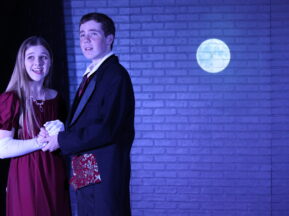In August 2018, ProtoStar Foundation was pleased to make a one-year $10,000 grant to Unscripted Learning, a 501(c)(3) organization, to support its program “CONNECTIONS.” The program is an innovative one in that it uses improvised theatre to help teenagers and young adults with Autism Spectrum Disorders (“ASD”) improve their creative thinking, listening, and social awareness and to develop a variety of social and communication skills in a safe environment.
In December 2019, ProtoStar renewed a grant of $7,000 to Unscripted Learning for the 2019-2020 and 2020-2021 fiscal years,[1] to be allocated as follows: (1) $6,000 to fund the development of a model curriculum and teacher training materials for its CONNECTIONS program; and (2) $1,000 to replenish the bursary, previously established by ProtoStar, for families in need of financial aid. The purpose of the grant was to help enable Unscripted Learning, a 501(c)(3) organization, to replicate the CONNECTIONS program in other parts of Southern California and perhaps even across the entire state.
By December 2021, the model curriculum and training materials evolved into a 176-page book entitled “Improvised Theatre and the Autism Spectrum: A Practical Guide to Teaching Social Connection and Communication Skills.”[2]
A. Autism Spectrum Disorders: An Underserved Need
Under the Diagnostic and Statistical Manual of Mental Disorders-V (“DSM-V”), published by the American Psychiatric Association (“APA”), there are two types of symptoms that are generally associated with ASD: (1) persistent deficits in social communication and interaction; and (2) restricted, repetitive patterns of behavior, interests, and activities. According to a study conducted by the Center for Disease Control (“CDC”) in 2014, approximately 1 out of 59 children in the U.S. has been diagnosed with ASD.[3] This percentage is a startling increase from the years 2000-2002, when approximately 1 out of 150 children was diagnosed with ASD.[4] More than 3.5 million Americans live with ASD, which cuts across all racial, ethnic, and socioeconomic groups. According to the Autism Society, it costs more than $8,600 extra per year to educate a child with ASD.[5]
A 2015 report published by the A.J. Drexel Autism Institute found that young adults with ASD had much higher unemployment rates and greater feelings of isolation than those with other disabilities.[6] In 2017, nearly 66% of adults with ASD were unemployed.[7] The growing unemployment rate amongst adults with ASD may be the result of the ongoing shift in jobs from manufacturing to the service industry. As Paul Shattuck, an associate professor at Drexel University’s School of Public Health, observed, “And those types of jobs [in the service sector], which require lots of social interaction, are exactly the types of jobs that people with autism have difficulty with.”[8] Professor Shattuck further noted that young adults face a “services cliff.” While public school students with ASD may receive tutoring, mental health services, and other support through their school’s special education program, as required by Federal law, those special education services cease to exist as soon as the student graduates from high school. “What you are left with is a hodgepodge patchwork of different public services that are pretty difficult to access.”[9]
B. The CONNECTIONS Program
Unscripted Learning’s CONNECTIONS Program is seeking to address these issues by taking a novel approach to helping adolescents and young adults improve their social skills and competency. It uses the tools of theatre improvisation to help them “explore a variety of emotions, listening skills, and pragmatic language, while building relationships with their peers through play.” The program was conceived by Gary Kramer, the artistic director of San Diego’s National Comedy Theatre, and Richie Ploesch, a special education teacher with a Master’s Degree and a Board Certified Behavior Analyst specializing in educating students and young adults with ASD.
The premise of the CONNECTIONS program is that many of the basic principles of improvisation theatre are similar to the types of social, communication, and interactive skills that educators try to teach their students with ASD. The program then uses some of the techniques used in theatre improvisation and incorporates them into the curriculum for adolescents with ASD. Prior to the pandemic, the curriculum was divided into five six-week sessions, with each session devoted to a particular topic or skill. An example would be “Emotional Connection,” which focuses on portraying emotions through vocal intonation and actions and paying attention to other people’s actions and facial expressions to interpret emotions.
C. Impact of ProtoStar’s 2018-2019 Grant
In connection with the 2018-2019 grant, ProtoStar worked with Unscripted Learning to set certain goals. Unscripted Learning met or exceeded those goals in at least the following ways:
-
-
Unscripted Learning expanded the number of parallel workshops from two to three, and it offered full or partial bursaries to 10 teenagers and young adults with ASD.
-
More than 90% of the participants demonstrated a positive change in social behaviors and interpersonal skills, as documented in a San Diego State University (SDSU) Study.
-







Leave a Reply
Your email is safe with us.